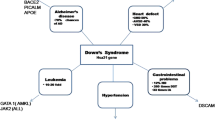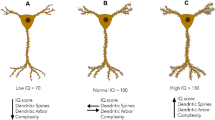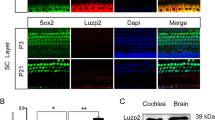Abstract
Mutations of GJB2, which encodes connexin 26, are the most common cause of hereditary hearing loss in many human populations. This study was initiated to determine the prevalence of GJB2 mutations in individuals with hearing loss from the Hazara Division in Pakistan. We recruited 70 participants with nonsyndromic deafness segregating as an apparently recessive trait and directly sequenced the GJB2 coding region from their DNA. The homozygous mutations c.71 G→A (p.W24X), c.104 T→G (p.I35S), and c.35delG (p.G12VfsX1) were identified as the cause of hearing loss in three participants (4.28%); in populations from other areas of Pakistan, frequencies of 6–7% have been observed. The mutations c.104 T→G and c.35delG were identified in Pakistan for the first time. These results confirm the low prevalence of GJB2 mutations in Hazara and suggest that mutations in other genes may play a significant role in the etiology of deafness in this population.

Similar content being viewed by others
References
Bonyadi M, Esmaeili M, Abhari M, Lotfi A (2009) Mutation analysis of familial GJB2-related deafness in Iranian Azeri Turkish patients. Genet Test Mol Biomark 3:689–692
Dahl HH, Saunders K, Kelly TM, Osborn AH, Wilcox S, Cone-Wesson B, Wunderlich JL, Dusart D, Kamarinos M, Gardner RJ, Dennehy S, Williamson R, Vallance N, Mutton P (2001) Prevalence and nature of connexin 26 mutations in children with non-syndromic deafness. Med J Aust 175:191–194
Del Castillo FJ, Del Castillo I (2011) The DFNB1 subtype of autosomal recessive non-syndromic hearing impairment. Front Biosci 16:3252–3274
Denoyelle F, Lina-Granade G, Plauchu H, Bruzzone R, Chaib H, Levi-Acobas F, Weil D, Petit C (1998) Connexin 26 gene linked to a dominant deafness. Nature 393:319–320
Mani RS, Ganapathy A, Jalvi R, Srikumari Srisailapathy CR, Malhotra V, Chadha S, Agarwal A, Ramesh A, Rangasayee RR, Anand A (2009) Functional consequences of novel connexin 26 mutations associated with hereditary hearing loss. Eur J Hum Genet 17:502–509
Pampanos A, Economides J, Iliadou V, Neou P, Leotsakos P, Voyiatzis N, Eleftheriades N, Tsakanikos M, Antoniadi T, Hatzaki A, Konstantopoulou I, Yannoukakos D, Gronskov K, Brondum-Nielsen K, Grigoriadou M, Gyftodimou J, Iliades T, Skevas A, Petersen MB (2002) Prevalence of GJB2 mutations in prelingual deafness in the Greek population. Int J Pediatr Otorhinolaryngol 2:101–108
Santos RL, Wajid M, Pham TL, Hussan J, Ali G, Ahmad W, Leal SM (2005) Low prevalence of Connexin 26 (GJB2) variants in Pakistani families with autosomal recessive non-syndromic hearing impairment. Clin Genet 67:61–68
Snoeckx RL, Huygen PL, Feldmann D, Marlin S, Denoyelle F, Waligora J, Mueller-Malesinska M et al (2005) GJB2 mutations and degree of hearing loss: a multicenter study. Am J Hum Genet 77:945–957
Yoong SY, Mavrogiannis LA, Wright J, Fairley L, Bennett CP, Charlton RS, Spencer N (2011) Low prevalence of DFNB1 (connexin 26) mutations in British Pakistani children with non-syndromic sensorineural hearing loss. Arch Dis Child 96:798–803
Acknowledgments
We are thankful to Dr. Mukhtiar Hassan for his support during MPhil thesis work at the Department of Biochemistry, Hazara University, Mansehra, Pakistan. We are also grateful to the participants in the study and to EDO Social Welfare Department Mansehra and Abbottabad. We also acknowledge the efforts of the Director of the Almunir Foundation for Disabled Children, Mansehra; the Director of the Al-Huda Speech Center, Abbottabad; and the principals of government schools for deaf children in Mansehra and Abbottabad for their help in identifying study participants. This research was supported by grant no. R01TW007608 from the Fogarty International Center and National Institute of Deafness and Other Communication Disorders, National Institutes of Health, USA.
Author information
Authors and Affiliations
Corresponding author
Rights and permissions
About this article
Cite this article
Bukhari, I., Mujtaba, G. & Naz, S. Contribution of GJB2 Mutations to Hearing Loss in the Hazara Division of Pakistan. Biochem Genet 51, 524–529 (2013). https://doi.org/10.1007/s10528-013-9583-z
Received:
Accepted:
Published:
Issue Date:
DOI: https://doi.org/10.1007/s10528-013-9583-z




